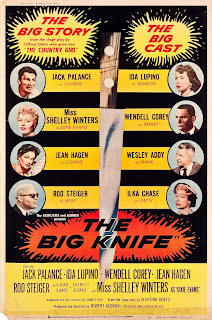The Big Knife
I knew nothing about The Big Knife when I started watching it. Almost immediately I sensed that it was adapted from a play, as it had mostly one setting and all the characters spoke as if their lines were written, not organically spoken. Turns out I was right--it was based on a play by Clifford Odets, and it gives me a chance to talk about films based on plays.
To start with, The Big Knife is also about Hollywood, and is one of the most scabrous films about that industry I've seen, and it was made in 1955. It almost seems like the script was biting the hand that fed it. It concerns a movie star, Jack Palance, who wants to get out of the business and pay attention to his family, including his wife, Ida Lupino,, with whom he is separated. It starts with him basically insulting a gossip columnist that wants dirt on his marriage. She tells him, "You're finished."
He is pressured to sign a new contract with the studio that made him rich and famous, run by Rod Steiger, who plays a particularly awful human being. Steiger has dirt on Palance about a car accident that killed a child, so Palance either signs or goes to jail. Another woman, Shelley Winters, was also in the car, and is threatening to talk. Palance is horrified to hear from Steiger's hatchet man, Wendell Corey, that they may have to "remove" her.
The Big Knife has nothing nice to say about Hollywood, and I'm kind of startled that it was ever made. It was directed by Robert Aldrich, and it's a bit claustrophobic. Almost all of it set in Palance's den, though there are the classic attempts to "break it open" by having scenes set outside or in different rooms. But I wonder if this claustrophobia was somewhat intentional, as it makes us feel Palance's being closed in even more vivid. The climax of the film is off-screen.
The film also stars Jean Hagen, as Palance's publicist's wife, whom he has been having an affair with. It turns out the publicist actually did jail time to cover for Palance's car accident, so the level of betrayal is extremely high. Everett Sloan, who was part of Orson Welles' Mercury Theater, appears as Palance's agent, an old school type who fights for his client even though he isn't getting the respect back.
The dialogue is extremely florid--nobody talks that way, except on the stage. At one point Sloan tells Palance, who sold out his values to be a movie star, "Half-idealism is like peritonitis of the soul." It's an eminently quotable movie, but not very realistic. Although I'm sure the situation is very realistic.
To start with, The Big Knife is also about Hollywood, and is one of the most scabrous films about that industry I've seen, and it was made in 1955. It almost seems like the script was biting the hand that fed it. It concerns a movie star, Jack Palance, who wants to get out of the business and pay attention to his family, including his wife, Ida Lupino,, with whom he is separated. It starts with him basically insulting a gossip columnist that wants dirt on his marriage. She tells him, "You're finished."
He is pressured to sign a new contract with the studio that made him rich and famous, run by Rod Steiger, who plays a particularly awful human being. Steiger has dirt on Palance about a car accident that killed a child, so Palance either signs or goes to jail. Another woman, Shelley Winters, was also in the car, and is threatening to talk. Palance is horrified to hear from Steiger's hatchet man, Wendell Corey, that they may have to "remove" her.
The Big Knife has nothing nice to say about Hollywood, and I'm kind of startled that it was ever made. It was directed by Robert Aldrich, and it's a bit claustrophobic. Almost all of it set in Palance's den, though there are the classic attempts to "break it open" by having scenes set outside or in different rooms. But I wonder if this claustrophobia was somewhat intentional, as it makes us feel Palance's being closed in even more vivid. The climax of the film is off-screen.
The film also stars Jean Hagen, as Palance's publicist's wife, whom he has been having an affair with. It turns out the publicist actually did jail time to cover for Palance's car accident, so the level of betrayal is extremely high. Everett Sloan, who was part of Orson Welles' Mercury Theater, appears as Palance's agent, an old school type who fights for his client even though he isn't getting the respect back.
The dialogue is extremely florid--nobody talks that way, except on the stage. At one point Sloan tells Palance, who sold out his values to be a movie star, "Half-idealism is like peritonitis of the soul." It's an eminently quotable movie, but not very realistic. Although I'm sure the situation is very realistic.



Comments
Post a Comment